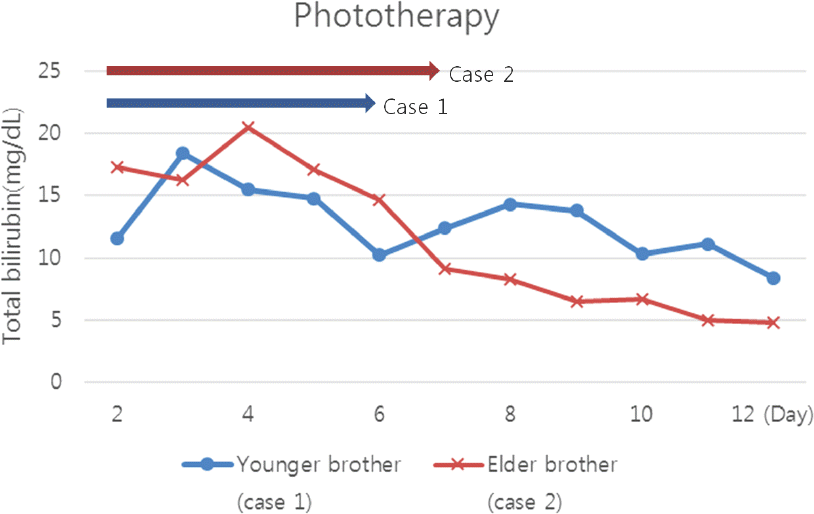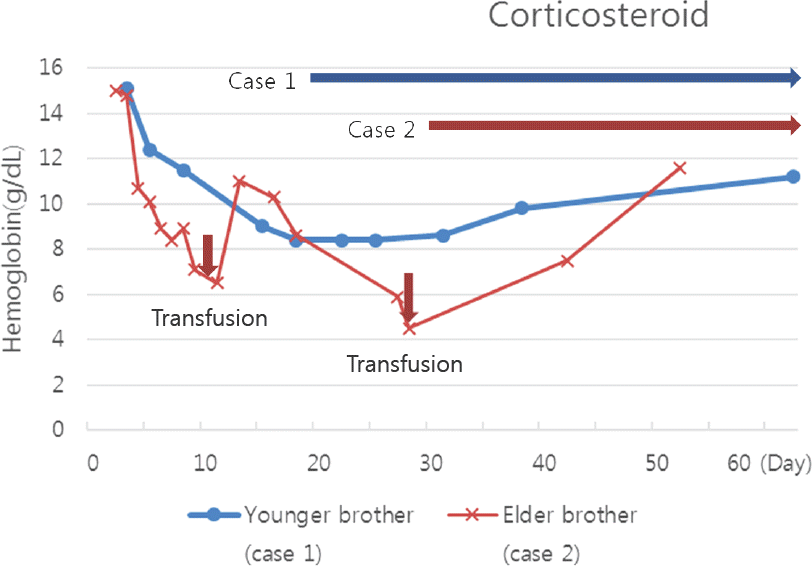Abstract
Hemolytic disease of the newborn (HDN) caused by anti-M is rare and clinical manifestations are variable ranging from mild anemia and hyperbilirubinemia to hydrops fetalis and intrauterine fetal death. There were few reports of HDN caused by anti-M in Korea but no case in siblings. We experienced a case of 2 male siblings, both of whom had anti-M induced HDN and prolonged anemia persisted for over a month. We report this case with a brief review of literature. This report documents the first case of HDN caused by anti-M in siblings in Korea.
References
1. Kilegman RM, Stanton B, Behrma R, St. Geme J, Schor NF. Nelson textbook of pediatrics. 20th ed.Canada: Elsevier;2015. p. p883–6.
2. Nathan DG, Orkin SH, Ginsburg D, Look AT. Nathan and Oski's hematology of infancy and childhood. 7th ed.W.B. Saunders Co;2008. p. p67–93.
3. Jung JH, Koo GD, Bae CW, Choi YM. Neonatal hemolytic disease due to minor blood group isoimmunization; analysis of reported cases in Korea. J Korean Pediatr Soc. 1999; 42:844–51.
4. Bae CW, Choi YM, Ahn CI. Clinico-hematologic observation of neonatal hemolytic disease due to minor blood group isoimmunization. J Korean Pediatr Soc. 1987; 30:504–10.
5. Moncharmont P, Dupraz FJ, Vignal M, Rigal D, Meyer F, Debeaux P. Haemolytic disease of the newborn infant. Long term efficiency of the screening and the prevention of alloimmunization in the mother: thirty years of experience. Arch Gynecol Obstet. 1991; 248:175–80.

6. Landsteiner K, Levine P. A new agglutinable factor differentiating individual human blood groups. Proc Soc Exp Biol Med. 1927; 24:600.
7. Landsteiner K, Levine P. Further observation on individual difference of human blood. Proc Soc Exp Biol Med. 1927; 24:941–5.
8. Wolff E, Johnson B. Studien uber die untergruppen A1 and A2 mit besonderer berucksichtingung der paternitatuntersu-chungen. Dtsch Ztschr Gerichtl Med. 1933; 22:65–85.
9. Thompson DJ, Stults DZ, Daniel SJ. Anti-M antibody in pregnancy. Obstet Gynecol Surv. 1989; 44:637–41.

10. Giblett ER. Blood group antibodies causing hemolytic disease of the newborn. Clin Obstet Gynecol. 1964; 7:1044.

11. Bomchil G. Isoimmunication por el antigen M. Neuva cause de enfermedad hemolytic neonatal. Hematologia Hemote-ropia. 1951; 3:104.
12. Ishida A, Ohto H, Yasuda H, Negishi Y, Tsuki H, Arakawa T, et al. S. Anti-M antibody induced prolonged anemia following hemolytic disease of the newborn due to erythropoietic suppression. J Pediatr Hematol Oncol. 2015; 37:375–7.
13. Wikman A, Edner A, Gryfelt G, Jonsson B, Henter JI. Fetal hemolytic anemia and intrauterine death caused by anti-M immunization. Transfusion. 2007; 47:911–7.

14. Hinchliffe RF, Nolan B, Voara AJ, Stamps R. Neonatal pure red cell aplasia due to maternal anti-M. Arch Dis Child Fetal Neonatal Ed. 2006; 91:467–8.
15. Yasuda H, Ohto H, Nollet KE, Kawabata K, Saito S, Yagi Y, et al. Hemolytic disease of the fetus and newborn with late-onset anemia due to anti-M: a case report and review of the Japanese literature. Transfus Med Rev. 2014; 28:1–6.

16. Sato K, Hara T, Kondo T, Iwao H, Hond S. High-dose intravenous gammaglobulin therapy for neonatal immune hemolytic jaundice due to blood group incompatibility. Acta Paediatr Scnd. 1991; 80:163–6.
17. Vaughan JI, Manning M, Warwick RM, Letsky EA, Murray N, Roberts IA. Inhibition of erythroid progenitor cells by anti-Kell antibodies in fetal alloimmune anemia. N Engl J Med. 1998; 338:798–803.

18. Arndt PA, Garratty G, Daniels G, Green CA, Wilkes AM, Hunt P, et al. Late onset neonatal anaemia due to maternal anti-Ge: possible association with destruction of erythroid progenitors. Transfus Med. 2005; 15:125–32.




 PDF
PDF ePub
ePub Citation
Citation Print
Print




 XML Download
XML Download